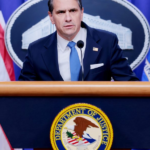Good morning!
HR leaders aren’t just leaving more often, they’re also leaving sooner. The average tenure for departing CHROs globally fell to slightly more than four years in the first quarter this year, down from four and a half years over Q1 in 2024, and significantly below the average of the past few years. And even more telling, nearly one in five (19%) of CHROs have served less than two years in the role.
All of this turnover is due in part to the massive shift in responsibilities CHROs have faced. While once considered a mostly administrative role, HR leaders are now expected to spearhead ambitious workforce transformation strategies and AI usage. Organizations are also realizing that they need their CHRO to be an active decision maker in the C-suite around topics that go beyond HR.
“The thing that I hear most from CEOs when recruiting their replacement is that their last CHRO was just not that strategic,” Brad Pugh, partner and leadership advisor at Russell Reynolds Associates, tells Fortune. “It might be AI, trade dynamics, or new competitive threats, but they need to be more strategic thinkers, people who have a broader, richer ability to think about all the factors impacting their company and their workforce.”
“CEOs want their person,” says Pugh. “Somebody who they feel chemistry with that matches the culture they’re trying to build in the company in the next era.”









